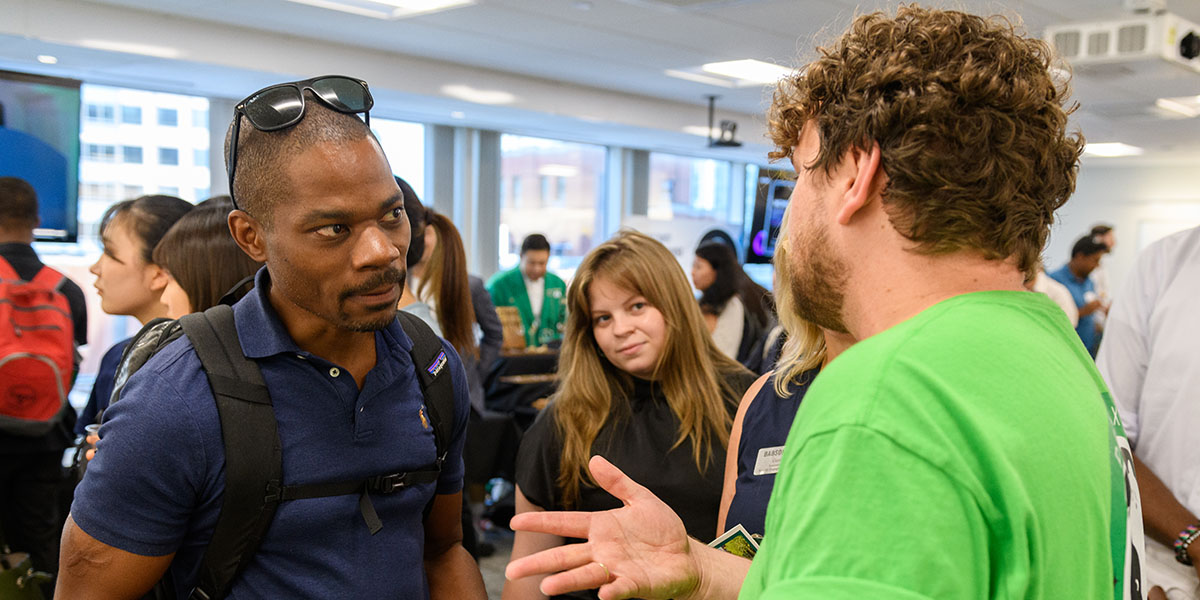How Entrepreneurs Can Navigate This Unpredictable Moment in Business

For any entrepreneur who was trying to build a business in the chaotic pandemic spring of 2020, the unease and uncertainty of the present business moment may feel eerily familiar.
The erratic implementation of tariffs, the up-and-down stock market, the sense that anything can change in an instant—all of that sparks those similar unsettled feelings.
But whether the year is 2025, or 2020, or one of the other host of years that have brought with them trouble and worry, the question isn’t whether entrepreneurs will face a crisis. The question is how will they deal with it.
“Crisis is not a single event. It is the reality of entrepreneurship now,” says Ben Spigel, an associate professor of entrepreneurship at Babson. “No matter how insulated you think you are, that doesn’t matter when the whole world around you changes, and you need to respond.”
Spigel has published a series of papers on how organizations and regions respond to moments of crisis. That research has taken him through all kinds of calamities—recession, the pandemic, and various business disruptions—but those investigations were more the result of happenstance than planning. “I study crisis not because I want to,” he says, “but because everything I study seems to collapse.”
As entrepreneurs labor over their ventures, Spigel offers his thoughts and strategies for navigating this moment of volatility and the next ones to come.
Embrace Flexibility
In soon-to-be-published research that was funded by the British government, Spigel looked at how entrepreneurs pursued innovation during the pandemic.

Some had no choice. Think of the venue booker who had no events to book, or the restaurateur who had no patrons to feed. In the middle of the pandemic, they needed to figure out new ways of doing business or else. “The only way out of that is to fundamentally change what you’re doing,” Spigel says.
Fortunately, entrepreneurs have a superpower: flexibility. Their organizations are typically small and nimble. “An entrepreneur can be flexible and change an entire company in six weeks,” Spigel says. “A larger company just can’t.”
Keep Calm and Carry On
That same research found that some entrepreneurs, when faced with the pandemic’s upheaval, decided to plow ahead. They had their plans to innovate and stuck with them, even if investors were harder to find and working from home meant a tricky adjustment.
“It was slower than intended, but they walked down the path they intended to,” Spigel says. “They innovated in spite of COVID.”
Find the Opportunity
A final group of entrepreneurs revealed in that pandemic research took yet another route toward innovation, leaning into the crisis and the opportunity it presented. That meant, for instance, not furloughing employees but instead allowing them to explore new products, services, and approaches to running the business.
“The shock allowed them to do things they couldn’t do before,” Spigel says. “That opportunity might not exist until there is a crisis.”
If entrepreneurs know their workforce well, if they know their employees’ capabilities, they can harness them in nontypical ways. “They are orientating people toward a goal, allowing them to be entrepreneurial in their own way,” Spigel says.
Become a Leader
In another piece of pandemic research, also funded by the British government, Spigel looked at the emotional leadership of entrepreneurs.
During the tumult of that time, entrepreneurs added another responsibility to their many concerns, that of looking after their staff’s physical and mental well-being. “A lot of founders had to take on this role of protecting their employees in ways they didn’t before,” Spigel says.
“Crisis is not a single event. It is the reality of entrepreneurship now. No matter how insulated you think you are, that doesn’t matter when the whole world around you changes, and you need to respond.”
Ben Spigel, associate professor of entrepreneurship
This was an adjustment for entrepreneurs. Suddenly, they found themselves in a role almost akin to a flight attendant, trying to keep everyone calm during extreme turbulence.
Offering support for employees, though, is all a part of being an entrepreneurial leader, whether there’s a crisis or not. “Fundamentally, it is about realizing you are a leader,” Spigel says. “You make this transition from being a founder to being a leader. It’s no longer just about you.”
Hire Smart People
Entrepreneurs need to accept that moments of crisis are inevitable in entrepreneurship. “The business of entrepreneurs needs to be crisis,” Spigel says. Once they accept that, entrepreneurs should build an organization that is strong and adaptable. That requires hiring smart, effective people.
“It is not just about responding to a crisis but being a resilient organization,” Spigel says. “Are you building an organization that is smarter than you, that has the ability to come up with ideas that you couldn’t have come up with?”
Posted in Entrepreneurial Leadership, Insights





